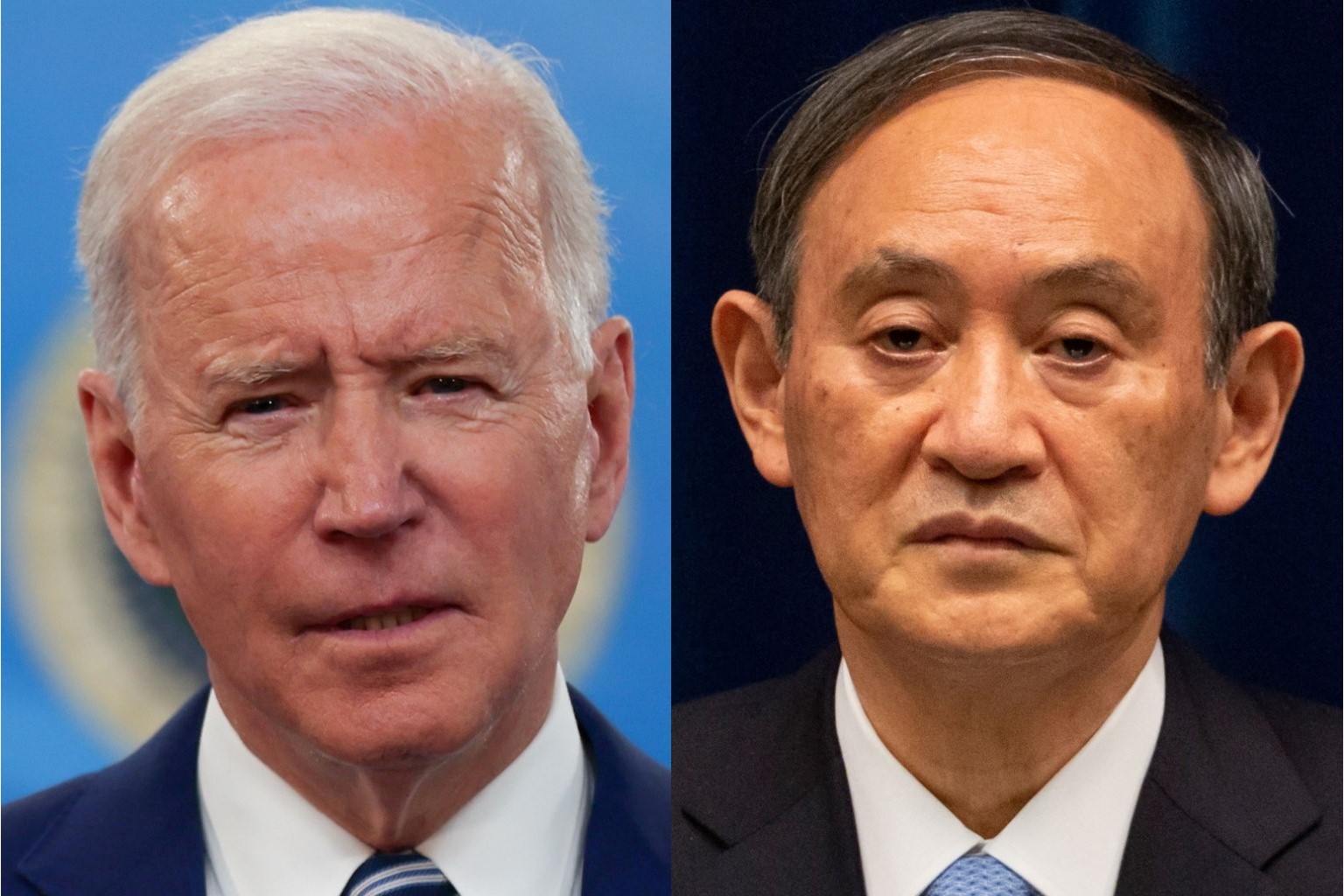Biden set to present united front on Taiwan with Suga
Joint statement expected at first in-person meeting with a foreign leader as China expresses concern over 'collusion'
Sign up now: Get ST's newsletters delivered to your inbox

US President Joe Biden and Japanese Prime Minister Yoshihide Suga will also discuss Beijing's treatment of Muslim Uighurs in the Xinjiang region and its crackdown on Hong Kong's democracy movement, while announcing a US$2 billion (S$2.7 billion) Japanese investment in 5G telecommunications to counter China's Huawei Technologies.
WASHINGTON • US President Joe Biden and Japanese Prime Minister Yoshihide Suga were to present a united front on Taiwan - China's most sensitive territorial issue, in a summit meeting yesterday, according to a senior US administration official.
President Biden's decision to invite Mr Suga as his first guest - with South Korean President Moon Jae-in set to come next month - reflects his renewed priority on US alliances as he zeroes in on a rising China as America's most pressing challenge.
Mr Biden and Mr Suga are expected to agree on a joint statement on Taiwan at the in-person meeting, said the official, who spoke on the condition of anonymity. China sees Taiwan as a breakaway province to be reunified, by force if necessary.
Mr Biden and Mr Suga will also discuss Beijing's treatment of Muslim Uighurs in the Xinjiang region and its crackdown on Hong Kong's democracy movement, while announcing a US$2 billion (S$2.7 billion) Japanese investment in 5G telecommunications to counter China's Huawei Technologies.
"You've seen a series of statements out of both the United States and Japan on the cross-strait circumstances on Taiwan, on our desire for the maintenance of peace and stability, on preserving the status quo, and I expect that you will see both a formal statement and consultations on these matters," the senior administration official told reporters.
The last time US and Japanese leaders referred to Taiwan in a joint statement was in 1969, when Japan's prime minister said maintenance of peace and security in the "Taiwan area" was important for its own security. That was before Tokyo normalised ties with Beijing in 1972.
The move now aims to ratchet up pressure on China. However, such a statement appears likely to fall short of what the United States has been hoping to see from Mr Suga, who inherited a China policy that sought to balance security concerns with deep economic ties when he took over as premier last September.
In a statement after a March meeting of US-Japan defence and foreign ministers, the two sides "underscored the importance of peace and stability in the Taiwan Strait" and shared "serious concerns" about human rights in Hong Kong and Xinjiang.
The US official said the summit statement would follow on "nicely" from that, and that both countries, while not wanting to raise tensions or provoke China, sought to send a clear signal that Beijing's dispatch of warplanes into Taiwan's airspace was incompatible with peace and stability.
China's foreign ministry spokesman Zhao Lijian said yesterday that China has expressed solemn concern about what he called "collusion" between Japan and the US, and the countries should take China's concerns seriously.
Taiwan President Tsai Ing-wen told emissaries visiting at Mr Biden's request on Thursday that the island would work with the US to deter threats from Chinese military activities.
The visit was "another concrete display showing the Taiwan-US relationship really is rock solid", Taiwan's Foreign Ministry said yesterday, after the delegation left.
A Japanese foreign ministry official said this week it had not been decided whether there would be a joint statement, and two Japanese ruling party lawmakers familiar with the discussions said officials have been divided over whether Mr Suga should endorse a strong statement on Taiwan.
With the meetings with Mr Suga and Mr Moon, Mr Biden is working to focus US military and diplomatic resources to the Indo-Pacific.
Mr Biden hopes to energise joint efforts with Australia, India and Japan, known as the Quad, plus South Korea, to counter both China and North Korea. Mr Biden and Mr Suga were also expected to announce plans yesterday for the next Quad meeting, the US official said.
Presenting a united front will require a delicate balancing act given Japan and South Korea's economic ties with China and the frosty relations between Seoul and Tokyo.
"It is concerning to us, even to the point of being painful, for us to see relations between Japan and South Korea fall to the current level," the US official said.
"The political tensions are such that we believe it actually impedes all of our abilities to be effective in North-east Asia, and I think the president will want to discuss this in some detail with Prime Minister Suga."
REUTERS, AGENCE FRANCE-PRESSE


